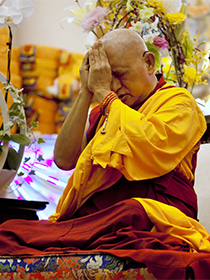- Home
- FPMT Homepage
Foundation for the Preservation of the Mahayana Tradition
The FPMT is an organization devoted to preserving and spreading Mahayana Buddhism worldwide by creating opportunities to listen, reflect, meditate, practice and actualize the unmistaken teachings of the Buddha and based on that experience spreading the Dharma to sentient beings. We provide integrated education through which people’s minds and hearts can be transformed into their highest potential for the benefit of others, inspired by an attitude of universal responsibility and service. We are committed to creating harmonious environments and helping all beings develop their full potential of infinite wisdom and compassion. Our organization is based on the Buddhist tradition of Lama Tsongkhapa of Tibet as taught to us by our founders Lama Thubten Yeshe and Lama Thubten Zopa Rinpoche.
- Willkommen
Die Stiftung zur Erhaltung der Mahayana Tradition (FPMT) ist eine Organisation, die sich weltweit für die Erhaltung und Verbreitung des Mahayana-Buddhismus einsetzt, indem sie Möglichkeiten schafft, den makellosen Lehren des Buddha zuzuhören, über sie zur reflektieren und zu meditieren und auf der Grundlage dieser Erfahrung das Dharma unter den Lebewesen zu verbreiten.
Wir bieten integrierte Schulungswege an, durch denen der Geist und das Herz der Menschen in ihr höchstes Potential verwandelt werden zum Wohl der anderen – inspiriert durch eine Haltung der universellen Verantwortung und dem Wunsch zu dienen. Wir haben uns verpflichtet, harmonische Umgebungen zu schaffen und allen Wesen zu helfen, ihr volles Potenzial unendlicher Weisheit und grenzenlosen Mitgefühls zu verwirklichen.
Unsere Organisation basiert auf der buddhistischen Tradition von Lama Tsongkhapa von Tibet, so wie sie uns von unseren Gründern Lama Thubten Yeshe und Lama Thubten Zopa Rinpoche gelehrt wird.
- Bienvenidos
La Fundación para la preservación de la tradición Mahayana (FPMT) es una organización que se dedica a preservar y difundir el budismo Mahayana en todo el mundo, creando oportunidades para escuchar, reflexionar, meditar, practicar y actualizar las enseñanzas inconfundibles de Buda y en base a esa experiencia difundir el Dharma a los seres.
Proporcionamos una educación integrada a través de la cual las mentes y los corazones de las personas se pueden transformar en su mayor potencial para el beneficio de los demás, inspirados por una actitud de responsabilidad y servicio universales. Estamos comprometidos a crear ambientes armoniosos y ayudar a todos los seres a desarrollar todo su potencial de infinita sabiduría y compasión.
Nuestra organización se basa en la tradición budista de Lama Tsongkhapa del Tíbet como nos lo enseñaron nuestros fundadores Lama Thubten Yeshe y Lama Zopa Rinpoche.
A continuación puede ver una lista de los centros y sus páginas web en su lengua preferida.
- Bienvenue
L’organisation de la FPMT a pour vocation la préservation et la diffusion du bouddhisme du mahayana dans le monde entier. Elle offre l’opportunité d’écouter, de réfléchir, de méditer, de pratiquer et de réaliser les enseignements excellents du Bouddha, pour ensuite transmettre le Dharma à tous les êtres. Nous proposons une formation intégrée grâce à laquelle le cœur et l’esprit de chacun peuvent accomplir leur potentiel le plus élevé pour le bien d’autrui, inspirés par le sens du service et une responsabilité universelle. Nous nous engageons à créer un environnement harmonieux et à aider tous les êtres à épanouir leur potentiel illimité de compassion et de sagesse. Notre organisation s’appuie sur la tradition guéloukpa de Lama Tsongkhapa du Tibet, telle qu’elle a été enseignée par nos fondateurs Lama Thoubtèn Yéshé et Lama Zopa Rinpoché.
Visitez le site de notre Editions Mahayana pour les traductions, conseils et nouvelles du Bureau international en français.
Voici une liste de centres et de leurs sites dans votre langue préférée
- Benvenuto
L’FPMT è un organizzazione il cui scopo è preservare e diffondere il Buddhismo Mahayana nel mondo, creando occasioni di ascolto, riflessione, meditazione e pratica dei perfetti insegnamenti del Buddha, al fine di attualizzare e diffondere il Dharma fra tutti gli esseri senzienti.
Offriamo un’educazione integrata, che può trasformare la mente e i cuori delle persone nel loro massimo potenziale, per il beneficio di tutti gli esseri, ispirati da un’attitudine di responsabilità universale e di servizio.
Il nostro obiettivo è quello di creare contesti armoniosi e aiutare tutti gli esseri a sviluppare in modo completo le proprie potenzialità di infinita saggezza e compassione.
La nostra organizzazione si basa sulla tradizione buddhista di Lama Tsongkhapa del Tibet, così come ci è stata insegnata dai nostri fondatori Lama Thubten Yeshe e Lama Zopa Rinpoche.
Di seguito potete trovare un elenco dei centri e dei loro siti nella lingua da voi prescelta.
- 欢迎 / 歡迎
简体中文
“护持大乘法脉基金会”( 英文简称:FPMT。全名:Foundation for the Preservation of the Mahayana Tradition) 是一个致力于护持和弘扬大乘佛法的国际佛教组织。我们提供听闻,思维,禅修,修行和实证佛陀无误教法的机会,以便让一切众生都能够享受佛法的指引和滋润。
我们全力创造和谐融洽的环境, 为人们提供解行并重的完整佛法教育,以便启发内在的环宇悲心及责任心,并开发内心所蕴藏的巨大潜能 — 无限的智慧与悲心 — 以便利益和服务一切有情。
FPMT的创办人是图腾耶喜喇嘛和喇嘛梭巴仁波切。我们所修习的是由两位上师所教导的,西藏喀巴大师的佛法传承。
繁體中文
護持大乘法脈基金會”( 英文簡稱:FPMT。全名:Found
ation for the Preservation of the Mahayana Tradition ) 是一個致力於護持和弘揚大乘佛法的國際佛教組織。我們提供聽聞, 思維,禪修,修行和實證佛陀無誤教法的機會,以便讓一切眾生都能 夠享受佛法的指引和滋潤。 我們全力創造和諧融洽的環境,
為人們提供解行並重的完整佛法教育,以便啟發內在的環宇悲心及責 任心,並開發內心所蘊藏的巨大潛能 — 無限的智慧與悲心 – – 以便利益和服務一切有情。 FPMT的創辦人是圖騰耶喜喇嘛和喇嘛梭巴仁波切。
我們所修習的是由兩位上師所教導的,西藏喀巴大師的佛法傳承。 察看道场信息:
- FPMT Homepage
- News/Media
-
- Study & Practice
-
-
- About FPMT Education Services
- Latest News
- Programs
- New to Buddhism?
- Buddhist Mind Science: Activating Your Potential
- Heart Advice for Death and Dying
- Discovering Buddhism
- Living in the Path
- Exploring Buddhism
- FPMT Basic Program
- FPMT Masters Program
- FPMT In-Depth Meditation Training
- Maitripa College
- Lotsawa Rinchen Zangpo Translator Program
- Universal Education for Compassion & Wisdom
- Online Learning Center
-
- Prayers & Practice Materials
- Overview of Prayers & Practices
- Full Catalogue of Prayers & Practice Materials
- Explore Popular Topics
- Benefiting Animals
- Chenrezig Resources
- Death & Dying Resources
- Lama Chopa (Guru Puja)
- Lama Zopa Rinpoche: Compendium of Precious Instructions
- Lama Zopa Rinpoche: Life Practice Advice
- Lama Zopa Rinpoche Practice Series
- Lamrim Resources
- Mantras
- Prayer Book Updates
- Purification Practices
- Sutras
- Thought Transformation (Lojong)
- Audio Materials
- Dharma Dates - Tibetan Calendar
- Translation Services
- Publishing Services
- Ways to Offer Support
- Prayers & Practice Materials
-
- Teachings and Advice
- Find Teachings and Advice
- Lama Zopa Rinpoche Advice Page
- Lama Zopa Rinpoche: Compendium of Precious Instructions
- Lama Zopa Rinpoche Video Teachings
- ༧སྐྱབས་རྗེ་བཟོད་པ་རིན་པོ་ཆེ་མཆོག་ནས་སྩལ་བའི་བཀའ་སློབ་བརྙན་འཕྲིན།
- Podcasts
- Lama Yeshe Wisdom Archive
- Buddhism FAQ
- Dharma for Young People
- Resources on Holy Objects
- Teachings and Advice
-
-
*If a menu item has a submenu clicking once will expand the menu clicking twice will open the page.
-
-
- Centers
-
- Teachers
-
- Projects
-
-
-
-
*If a menu item has a submenu clicking once will expand the menu clicking twice will open the page.
-
-
- FPMT
-
- Shop
-
-
-
The Foundation Store is FPMT’s online shop and features a vast selection of Buddhist study and practice materials written or recommended by our lineage gurus. These items include homestudy programs, prayers and practices in PDF or eBook format, materials for children, and other resources to support practitioners.
Items displayed in the shop are made available for Dharma practice and educational purposes, and never for the purpose of profiting from their sale. Please read FPMT Foundation Store Policy Regarding Dharma Items for more information.
-
-
26
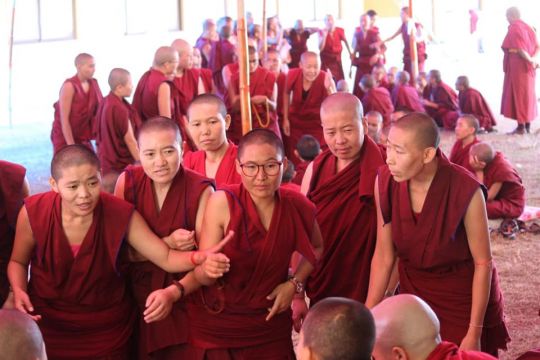
Two nuns from Kopan Nunnery, nuns from Jangchub Choeling Nunnery, and nuns from Dolma Ling Nunnery and Institute, Nuns’ Jang Guncho, Kopan Nunnery, Kathmandu, Nepal, October 2018. Photo by Kopan Nunnery.
Monks have held the Jang Guncho for centuries. The first Nuns’ Jang Guncho took place in Dharamsala, India, in 1995. An annual event, the Nuns’ Jang Guncho is an opportunity for nunneries to gather together to train in and practice debate. The 2018 Nuns’ Jang Guncho took place at Khachoe Ghakyil Ling Nunnery (Kopan Nunnery), a FPMT nunnery in Kathmandu, Nepal. Ani Choesang, a Kopan nun since 1994, from Chobhar, Kathmandu, Nepal, and Ani Dhekyong, a Kopan nun since 1997, from Solu Khumbu, Nepal, share about the 2018 Nuns’ Jang Guncho and the Geshema Graduation ceremony held at their nunnery.
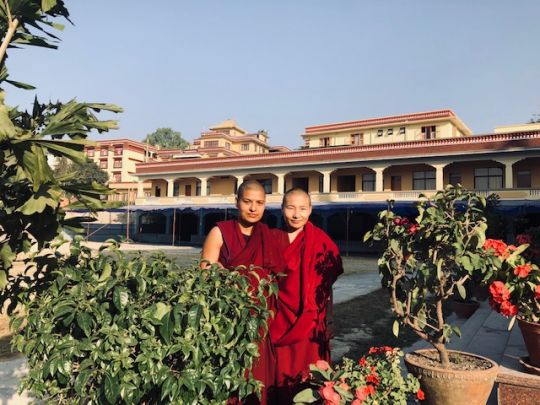
Ani Choesang and Ani Dhekyong, Kopan Nunnery, Kathmandu, Nepal, November 2018. Photo by Kopan Nunnery.
The Nuns’ Jang Guncho (annual winter debate session) was established in 1994 under the guidance of His Holiness the 14th Dalai Lama. It is being supported by the Tibetan Nuns Project and Central Tibetan Administration’s Department of Religion & Culture. This year was the 24th annual Nuns’ Jang Guncho.
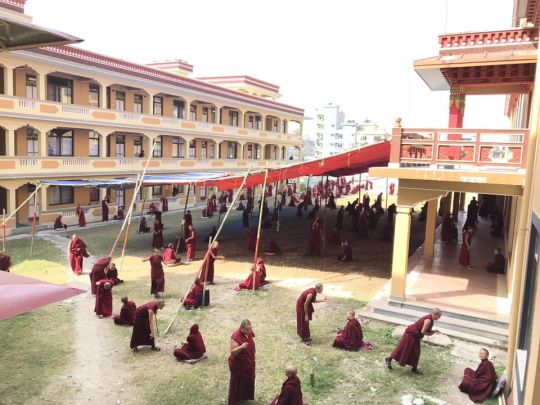
Nuns engaged in one-on-one debate during the Nuns’ Jang Guncho, Kopan Nunnery, Kathmandu, Nepal, October 2018. Photo by Kopan Nunnery.
This year the Nuns’ Jang Guncho was hosted by Kopan Nunnery in Nepal, and it was the second time here. About 710 nuns, 17 teachers, and some lay women from ten nunneries in India and Nepal gathered for one month-long training session in Tibetan Buddhist philosophy. We intensively studied the subject pramana (valid cognition) and the commentary of Shree Dharmakirti, Parmanavartika, for a month in preparation for the debate.
The nunneries represented this year were Dolma Ling Nunnery and Institute (Himachal Pradesh, India), Jamyang Choling Institute (Himachal Pradesh, India), Geden Choeling Nunnery (Himachal Pradesh, India), Jangchub Choeling Nunnery (Karnataka, India), Jangsem Ling (Himachal Pradesh, India), Jampa Choling Institute (Himachal Pradesh, India), Karma Samten Ling Nunnery (Pharping, Kathmandu, Nepal), Yangtchen Ling (Himachal Pradesh, India), Thukche Cho Ling Nunnery (Swayambhunath, Kathmandu, Nepal), and Kopan Nunnery.
This year’s Nuns’ Jang Guncho started on October 3 and ended on November 3.
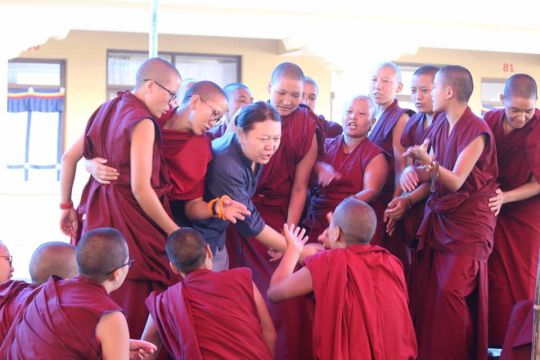
Lay woman and nuns from Jamyang Choeling Institute, nuns from Dolma Ling Nunnery and Institute, and nuns from Jangchub Choeling Nunnery, Nuns’ Jang Guncho, Kopan Nunnery, Kathmandu, Nepal, October 2018. Photo by Kopan Nunnery.
Most days we followed the same schedule.
We woke up at 4:45 a.m. and then memorized from 5-6:30 a.m. After breakfast, we had philosophy class from 7-9 a.m. followed by morning prayers and one-on-one debates from 9-10:30 a.m. Classes then debated with each other for one hour and then we had a lunch break.
After lunch, we had four and a half hours of philosophy classes followed by dinner at 5:30 p.m.
After dinner, we recited prayers for half an hour followed by a big debate between two nunneries from 7-8 p.m. Then we had a thirty-minute break before we debated one-on-one for another hour. The final organized activity of the day was from 10-10:30 p.m. when classes debated with each other.
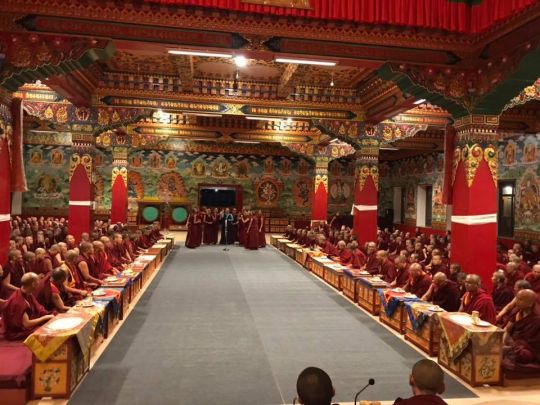
Evening debate session between lay woman and nuns from Jamyang Choeling Institute and nuns from Geden Choeling Nunnery, Nuns’ Jang Guncho, Kopan Nunnery, Kathmandu, Nepal, October 2018. Photo by Kopan Nunnery.
We hold two full-night debate celebrations during every Nuns’ Jang Guncho. This year the full-night debate celebrations took place on October 20 and November 2.
During each full-night debate celebration we debated from 6-10 p.m. We had four debates on October 20 and four debates on November 2.
On October 20 we assigned one class each from four nunneries to take the role of defender and assigned one class each from four nunneries to take the role of debater. The four classes in the role of debater then debated with the four classes in the role of defender.
We selected different groups of nuns for the four debates on November 2.
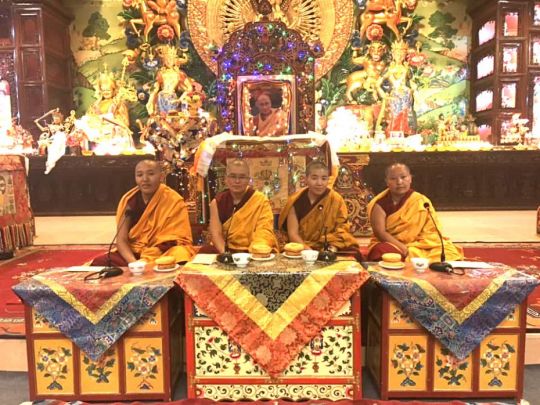
Lobsang Wangmo from Kopan Nunnery, Paldolma from Dolma Ling Nunnery and Institute, Lobsang Choesang from Thukche Cho Ling Nunnery, and Kelsang Choedon from Jamyang Choling Institute at the October 20th all-night debate celebration, Nuns’ Jang Guncho, Kopan Nunnery, Kathmandu, Nepal, October 2018. Photo by Kopan Nunnery.
The nuns engaged in debate in front of everyone who was attending the Nuns’ Jang Guncho. Many other geshe-las and monks from different monasteries in Kathmandu—including Kopan Monastery— came to watch the full-night debate celebrations. We celebrated the last full-night debate celebration on November 3 in the presence of our venerable abbot, Khen Rinpoche Geshe Thubten Chonyi.
The debate and discussion offers great opportunities to explore experiences and skills. The practice of debate combines logical thinking with a deeper understanding of Buddhist teachings. That will help nuns to preserve the Dharma and spread Buddha’s teachings in the modern world.
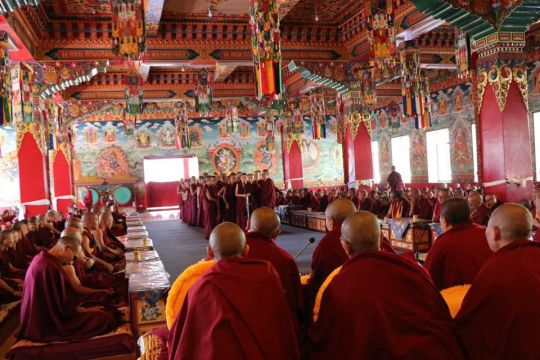
Nuns debated with the new geshemas during the Geshema Damcha, Kopan Nunnery, Kathmandu, Nepal, November 2018. Photo by Kopan Nunnery.
After the conclusion of the Nuns’ Jang Guncho we held a two-day celebration on November 3-4 during which we celebrated the Geshema Damcha, the final step in the geshema ceremony rituals. “Damcha” is the term given to the answering in the debate process.
Every nun from each nunnery debated during the two days of the Geshema Damcha celebration. The nuns debated on the subjects of the five major texts of Buddhist philosophy.
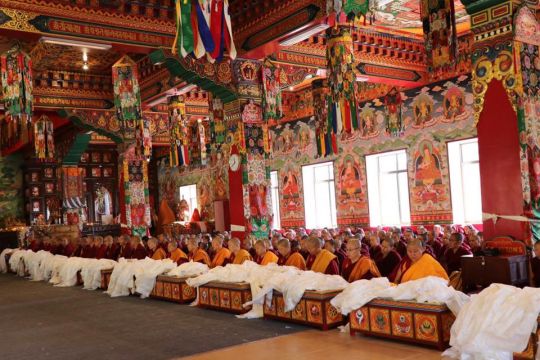
Geshema Graduation ceremony, Kopan Nunnery, Kathmandu, Nepal, November 2018. Photo by Kopan Nunnery.
On November 5 we celebrated the Geshema Graduation Ceremony 2018 at Kopan Nunnery. This year ten women became geshemas; seven of the new geshemas are from Jangchub Choeling Nunnery (Karnataka, India) and three are from Dolma Ling Nunnery and Institute (Himachal Pradesh, India).
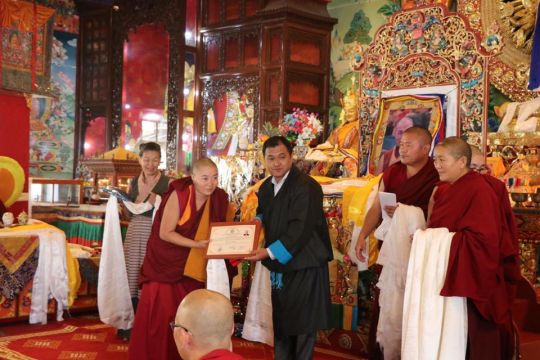
Geshema Tenzin Drolkar—who has been studying at Jangchub Choeling Nunnery since arriving from Tibet in 1996 at age 18—scored the highest marks and got first position out of the ten geshemas who graduated in 2018. Geshema Tenzin Drolkar took her turn, receiving a certificate from Mr. Tsultrim Gyatso, Central Tibetan Administration’s Coordinator for Tibetans in Nepal during the Geshema Graduation ceremony, Kopan Nunnery, Kathmandu, Nepal, November 2018. Photo by Kopan Nunnery.
On behalf of the entire Kopan family, we would like to extend huge congratulations to all the geshemas. We pray for them to have long lives, good health, and happiness. May their Dharma wishes be fulfilled without any obstacles.
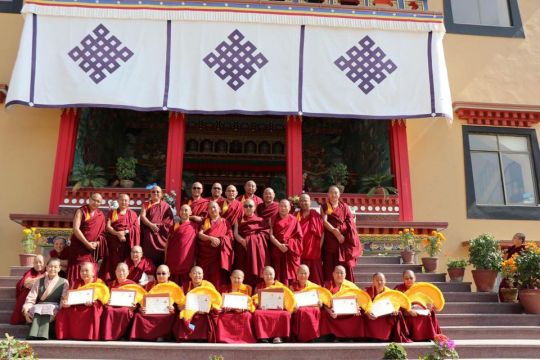
The ten new geshemas, geshe-las from ten nunneries who served as the teachers, Tibetan Nuns Project staff member Nangsel, a nun from Thukche Cho Ling Nunnery, a nun from Jamyang Choling Institute, and an unidentified nun at the Geshema Graduation Ceremony, Kopan Nunnery, Kathmandu, Nepal, November 2018. Photo by Kopan Nunnery.
You can find more information about Kopan Nunnery on their website.
FPMT.org and Mandala Publications brings you news of Lama Zopa Rinpoche and of activities, teachings, and events from over 160 FPMT centers, projects, and services around the globe. If you like what you read, consider becoming a Friend of FPMT, which supports our work.
- Tagged: ani choesang, ani dhekyong, debate, dolma ling nunnery and institute, geden choeling nunnery, geshema damcha, geshemas, jampa choling institute, jamyang choling institute, jang gunchoe, jangchub choeling nunnery, jangsem ling, karma samten ling nunnery, khachoe ghakyil ling, khen rinpoche geshe chonyi, kopan nunnery, nuns jang guncho, thukche cho ling nunnery, tibetan nuns project, winter debate, yangtchen ling
- Home
- News/Media
- Study & Practice
- About FPMT Education Services
- Latest News
- Programs
- New to Buddhism?
- Buddhist Mind Science: Activating Your Potential
- Heart Advice for Death and Dying
- Discovering Buddhism
- Living in the Path
- Exploring Buddhism
- FPMT Basic Program
- FPMT Masters Program
- FPMT In-Depth Meditation Training
- Maitripa College
- Lotsawa Rinchen Zangpo Translator Program
- Universal Education for Compassion & Wisdom
- Online Learning Center
- Prayers & Practice Materials
- Overview of Prayers & Practices
- Full Catalogue of Prayers & Practice Materials
- Explore Popular Topics
- Benefiting Animals
- Chenrezig Resources
- Death & Dying Resources
- Lama Chopa (Guru Puja)
- Lama Zopa Rinpoche: Compendium of Precious Instructions
- Lama Zopa Rinpoche: Life Practice Advice
- Lama Zopa Rinpoche Practice Series
- Lamrim Resources
- Mantras
- Prayer Book Updates
- Purification Practices
- Sutras
- Thought Transformation (Lojong)
- Audio Materials
- Dharma Dates – Tibetan Calendar
- Translation Services
- Publishing Services
- Teachings and Advice
- Find Teachings and Advice
- Lama Zopa Rinpoche Advice Page
- Lama Zopa Rinpoche: Compendium of Precious Instructions
- Lama Zopa Rinpoche Video Teachings
- ༧སྐྱབས་རྗེ་བཟོད་པ་རིན་པོ་ཆེ་མཆོག་ནས་སྩལ་བའི་བཀའ་སློབ་བརྙན་འཕྲིན།
- Podcasts
- Lama Yeshe Wisdom Archive
- Buddhism FAQ
- Dharma for Young People
- Resources on Holy Objects
- Ways to Offer Support
- Centers
- Teachers
- Projects
- Charitable Projects
- Make a Donation
- Applying for Grants
- News about Projects
- Other Projects within FPMT
- Support International Office
- Projects Photo Galleries
- Give Where Most Needed
- FPMT
- Shop
Subscribe to FPMT News
Translate*
*powered by Google TranslateTranslation of pages on fpmt.org is performed by Google Translate, a third party service which FPMT has no control over. The service provides automated computer translations that are only an approximation of the websites' original content. The translations should not be considered exact and only used as a rough guide.You are responsible for your own problems just as you’re responsible for your own liberation and enlightenment.







